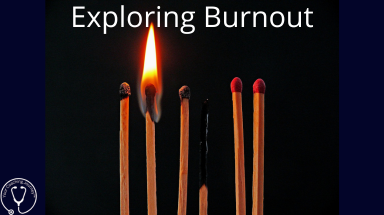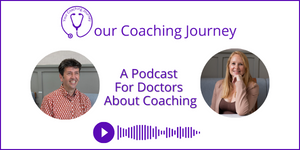Prefer to listen?
This blog post forms the basis of a podcast on our new coaching model, which you can listen to here.
This is a complex topic, so we can’t cover everything about burnout here. But we will begin to explore ‘burnout’ as a topic that might be brought to the coaching room.
Burnout is a term that most people will have heard of, especially in the medical profession. And if they’ve not experienced it for themselves, they will have had colleagues, patients, friends, perhaps family who have experienced it because it’s such a common issue.
Let’s start with a bit of a definition of burnout
The definition we’re going to use is from the original psychologist that started using it, who was Herbert Freudenberger, who defined it as
“the consequences of severe or prolonged stress and anxiety experienced by people working in the healing professions.”
That was his starting point, and the idea of burnout has evolved. But it’s still quite a loose definition. We would also want to explore
- What are the consequences?
- How do we define those consequences?
- And it’s also focusing solely on healing professions, and we know that people in executive arenas working for big corporates suffer with burnout too.
Herbert Freudenberger was working with disadvantaged people and was based in New York. And the term was actually borrowed from 1970’s street talk. It was used to describe the effects of chronic drug abuse. Across the other side of the U.S.A. in California, there was some research being done by Christina Maslach and her colleagues around the health service sector and working with service users. And people working in that sector also used the phrase ‘burnt out’. She came across it independently, they didn’t know about each other’s work, but both had this similar phrase. It’s obviously something in the zeitgeist at the time that burn out was a phrase that was being used. There is a book by Graham Greene from 1960 called A Burnt Out Case. It’s interesting that as a phrase, it’s been around a while. But no one really knows how it ended up meaning what it does today.
Christina Maslach is now a Professor Emeritus at the University of California. She has continued to work around burnout and on the back of the work that she was doing, she explored what was happening for these people that were talking about being burnt out. And what they talked about were three different elements:
- Emotional exhaustion
- De-personalisation, (a cynical detachment from the job)
- A sense of reduced personal accomplishment.
Her phrase ‘reduced personal accomplishment’, has now become a lack of efficacy. And the ‘emotional exhaustion’ seems to have given way a little bit, so it’s just ‘exhaustion’. It’s probably still referring to the combination of emotional, psychological, and physical. Her take on it was that the other two have to be present alongside the exhaustion in order for it to be described as burnout.
Christina Maslach came up with a burnout inventory, known as the Maslach Burnout Inventory. This is a questionnaire that you can fill in to see if you’re burnt out. You end up with a score on each of the three different dimensions.
- If you have a strong negative score on cynicism, that de-personalization element, that would result in you being disengaged.
- If you have a strong negative score on exhaustion, you’d be described as over extended, under too much pressure.
- If you have a strong negative score on personal efficacy, so that feeling like you’re not doing a good job, you would be seen as ineffective.
- If you were positive on all three scores, you would be seen as engaged.
- If you have three negative scores on those dimensions, then you would be seen as burnt out. But it would have to be on all three.
What she hasn’t presented in her research is what happens if you got a strong negative score on just two? There seems to be something missing there.
You could have a combination of exhausted and cynical, while still being good at your job. What do you describe that as?
And we would imagine a lot of medical professionals have a sense of conscientiousness, but are very cynical about the system, especially within the NHS. They would still have a sense that they would want to, if not be a perfectionist, they want to do the best they possibly can against all the odds, which obviously makes life very tough. If you have that perfectionism driver going on for you, but the system is failing you, there’s a good chance you’re going to end up with a sense of cynicism, you’re going to end up exhausted, and perhaps feeling like you’re not able to do a good job because the resources aren’t there for you to do a good job, which could end up with you being burnt out.
That’s one burnout theory, and mainly, arguably, referring to that organisational context. What else is there?
Other people have been doing other research into burnout, and there are now seven different burnout assessment tools that you could engage that are widely available.
- One of them measures compassion fatigue and traumatic stress, which again might well apply to many people in the medical profession.
- Another looks at the different types of burnout, for example, frenetic burnout, or under-challenge burnout*, and worn-out**.
*We don’t think many medical professionals would suffer from under-challenge burn out!
**Perhaps feeding in to the exhaustion element of the previous model.
- Another one looks at physical fatigue, cognitive weariness, and emotional exhaustion. So that combination of the three, which from Maslach’s perspective, all fits into exhaustion, as she doesn’t differentiate between the three.
- Then there’s the Copenhagen burnout inventory, which looks at personal burnout; the degree of physical and psychological fatigue based on your experience outside the work context. This could make sense for a lot of our doctors who are also parents and have extremely busy lives.
- There’s also work-related burnout; the level of burnout just based on the workplace and the pressures being put on them by the system and the environment.
- And then in a medical context, there’s patient-related burnout; that’s evaluating the elements that are directly related with the interactions with their patients.***
***This is about the medical professional and their relationship with the patient rather than relating to the patients themselves.
Let’s Talk About Work-Related Burnout
That obviously focuses on the symptoms of the work environment and the job that you’re doing. It could be that the work environment isn’t actually a toxic environment, it could be you’re just in the wrong job. We’ve talked before about personality types and how maybe as an introvert, if you are in a busy A&E department, and there’s lots going on and you’ve got to interact with lots of different people, that could be exhausting just because you’re an introvert. So there is a degree to which a good fit personality-wise is going to play into this a little bit. That’s a reason for burnout, but it can contribute. If you were in that space, then some of the symptoms that would start to feed into that is feeling tired when you actually think about work, being emotionally exhausted because of the work, just being worn out at the end of the day, not having enough energy for things outside of work. Feeling exhausted in the morning at the thought of going to work. I think a lot of people have this.
Different to that, the patient-related burnout is feeling tired just because of having to interact with other people, having to interact with the clients. So if you’ve got a particularly difficult set of patients that you’re working with, perhaps with complex needs, and they’re difficult to have conversations with, then that’s going to be exhausting and if you’ve got a string of those patients coming in front of you, that could easily end up with you feeling exhausted.
Is there a consensus on what people use in this country as the model of burnout?
Maslach seems to be the go-to inventory assessment tool that people use to assess burnout. But we don’t know that there’s a lot of assessment going on. We think the norm is for someone to get to ‘burnt out’ before anyone realises that they were heading for it. We know that a lot of people are just expected to get on with it. That’s still a big problem. These issues aren’t addressed early enough to do good work. We know that University Hospital Southampton, (many of their doctors have been on our programme) have a doctor’s development unit, which really is concerned about the care, the well-being of consultants, of senior doctors, because no one is looking after them. The system doesn’t look after them. They’ve done really good work in coaching and mentoring around those individuals that are under stress, maybe taking time off work, and how can they come back in a way that’s safe for them, that isn’t going to lead to them feeling burnt out again.
Many people talk about it, and there is so much good work going on in terms of well-being and well-being initiatives. But is it all coming together? There’s still an awful lot of people that are feeling really stressed and almost on the point of burnout. So, as much as that message is constantly distributed, I’m not sure how effective it is. It’s very difficult because within the NHS, the system is so demanding, and we, as patients, are so demanding. We’ve got that irony of COVID and we know how much pressure medical professionals were under during COVID. So they went through that huge experience of just probably all feeling burnt out at the end of it and then feeling like, well, we should have some relief now because it’s over. But then the system, and us as patients say, ‘yeah, but you’ve got all that catching up to do’.
Wellbeing initiatives are all very well, but if you don’t change the working environment, there’s only so much balancing out they can do. If the system isn’t going to change sufficiently for people not to feel burnt out, then it’s down to them to take some individual responsibility for how they look after themselves. They’re going to feel peer pressure to be there and be strong and show up. But there is a point where you have to take responsibility for your own well-being and start putting things in place that support you. That might feel like you’re letting other people down and putting more pressure on the, but until people start to change the way they work and put boundaries in place, and look after themselves burnout will continue.
We have had individuals come on our course who have ended up taking time off with burnout and struggling to go back to work. Because why would you want to? If you’ve ended up in an environment where you’ve been burned out, why would you go back to that? But actually, in terms of thinking about it and thinking about boundaries and thinking about how you might manage the environment safely for yourself, a lot of the doctors in that situation, that come on our course do go back to a clinical role. They’re back in the system. But hopefully, they can return to work in a way that’s safe for them and doesn’t result in them having more time off with burnout.
Is This Resonating a Little Too Much?
If you feel that you could benefit from coaching we have two resources for you. Firstly you will find some of our qualified coaches on our directory page. And secondly, we are able to offer some assistance with free coaching from the people who’ve been through our training programme and are currently accruing the coaching hours that they need to finalise their qualification. You can fill a form here and we will do our best to set you up with one of our trained coaches to help you.
How Does Coaching Help With Issues Around Burnout?
- Obviously, before we get anywhere near burnout, if people are feeling stressed and/or exhausted by the workplace, then coaching can help in terms of encouraging them to think about the boundaries they might put in place and how they look after their own wellbeing.
- By the time people get very close to burnout, we can still do good work in the coaching room. This could be through the cathartic nature of telling their story out loud, and being heard without judgement or advice, it could be through admitting there is a problem that needs to be resolved, perspective-gaining, boundaries, how to implement some basic self-care and replenish their energy, what conversations need to happen,
- And then if people do end up that they’re actually incapable of doing their job anymore, so they’re taking time off, coaching can help support them in how they return to work safely and in a way that actually they feel inspired and they want to go back to work, to perhaps reignite that passion that they had when they first started in medicine.
We’ve certainly had that on our course where people have thought that they were going to leave medicine, but through the coaching that they’ve had on the course and through thinking about things differently, they’ve suddenly found a real interest in what they were doing before. And they can return with some new skills to help them manage themselves more effectively within the system.
When you’re in the middle of it all, when you’re stressed under pressure and every day is a crisis, it’s very difficult to find the headspace, to lift yourself out of that and think, ‘Okay, what would it be good to be doing instead?’ Coaching is a great intervention to help people have the headspace to think properly about the situation.
We hope this has given a platform to start exploring burnout as a topic for coaching. We are certain to return to it in the future to explore it further. In the meantime, we would love to hear your thoughts, questions, experiences on burnout, and coaching in relation to burnout. Do get in touch if you have something to share.
Our delegates on both our coaching programmes receive coaching and supervision throughout the time we work with you, so if you would like to receive coaching, and learn the skills of being a coach why not take a look at our Doctors’ Transformational Coaching Diploma and our Transformational Coaching DIploma for Lifestyle Medicine.



